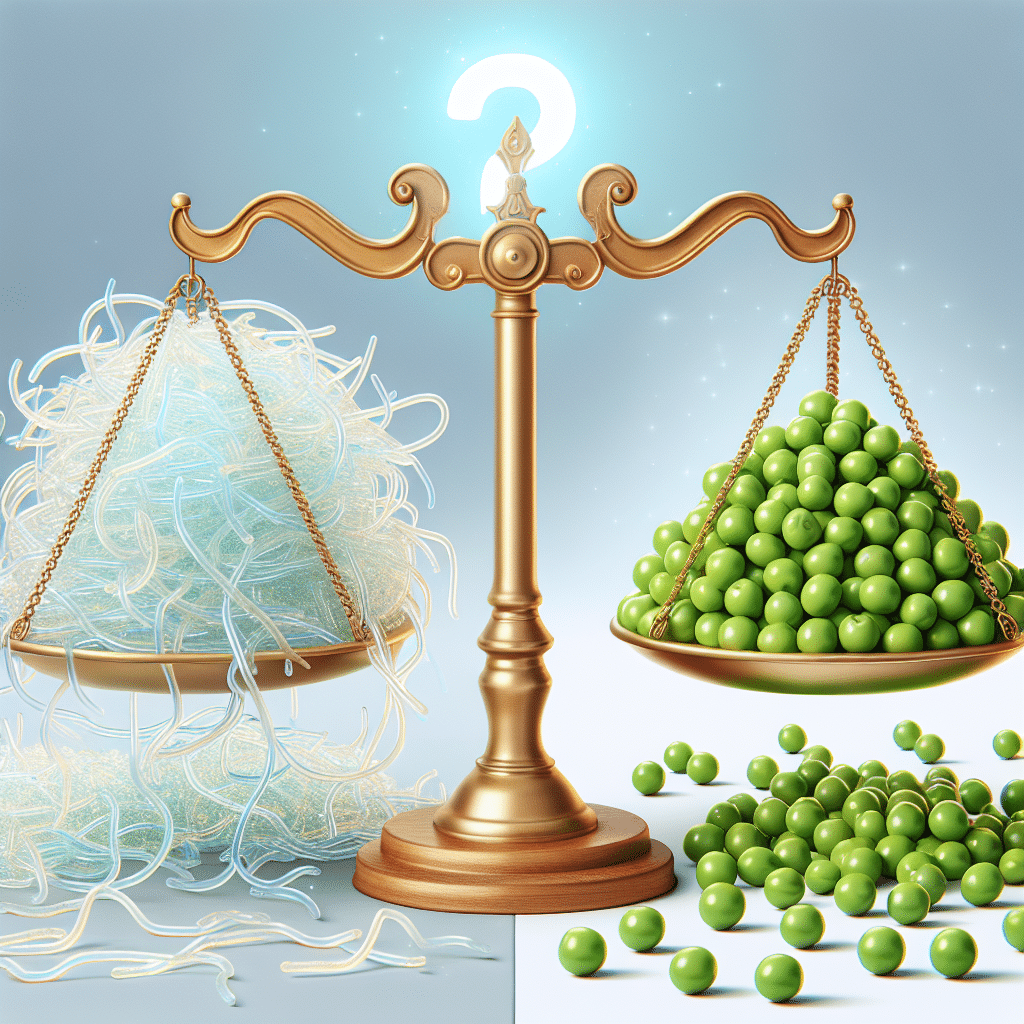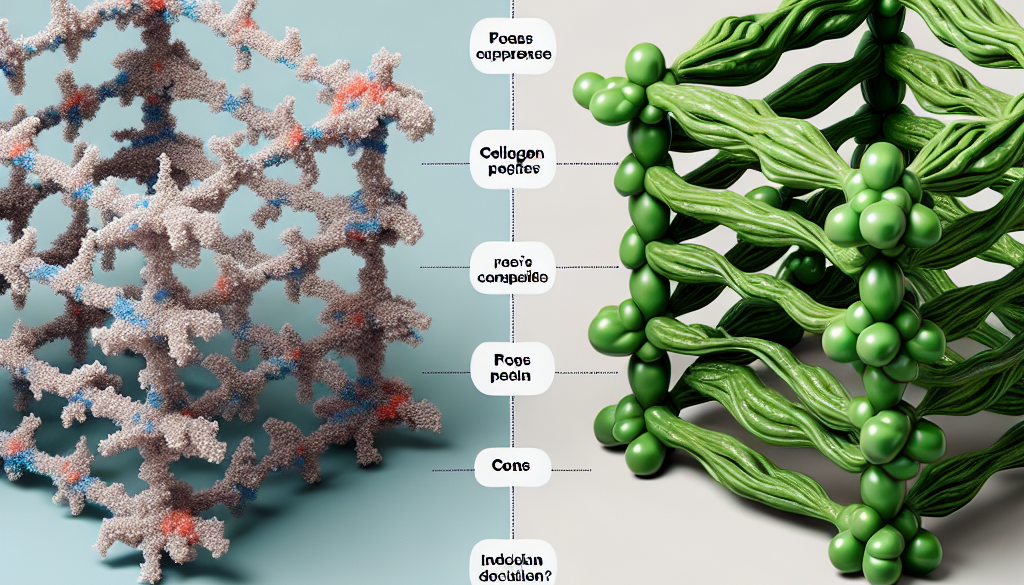Collagen Peptides vs Pea Protein: Which Is Better?
-
Table of Contents
Collagen Peptides vs Pea Protein: Which Is Better?

When it comes to protein supplements, there are a plethora of options available in the market. Two popular choices among health-conscious individuals are collagen peptides and pea protein. Both offer unique benefits and are widely used in various industries. In this article, we will compare collagen peptides and pea protein to determine which one is better for your specific needs.
What are Collagen Peptides?
Collagen peptides are derived from collagen, which is the most abundant protein in the human body. Collagen is responsible for maintaining the structural integrity of our skin, bones, tendons, and ligaments. As we age, our body’s natural collagen production decreases, leading to wrinkles, joint pain, and other signs of aging.
Collagen peptides are hydrolyzed collagen, meaning they have been broken down into smaller peptides for better absorption. They are typically sourced from animal by-products, such as bovine or marine sources. Collagen peptides are known for their ability to improve skin elasticity, promote joint health, and support healthy hair and nails.
What is Pea Protein?
Pea protein, on the other hand, is a plant-based protein derived from yellow split peas. It is a complete protein, meaning it contains all nine essential amino acids that our body needs but cannot produce on its own. Pea protein is also hypoallergenic, making it an excellent choice for individuals with food sensitivities or allergies.
Pea protein has gained popularity among vegans and vegetarians as a sustainable and environmentally friendly alternative to animal-based proteins. It is also easily digestible and has been shown to support muscle growth and repair, aid in weight loss, and regulate blood sugar levels.
Comparison: Collagen Peptides vs Pea Protein
Now that we have a basic understanding of collagen peptides and pea protein, let’s compare them in various aspects to determine which one is better:
1. Protein Content
When it comes to protein content, both collagen peptides and pea protein are excellent sources. Collagen peptides typically contain around 90% protein, while pea protein contains around 80-90% protein. However, it’s important to note that collagen peptides are not a complete protein as they lack certain essential amino acids.
2. Amino Acid Profile
As mentioned earlier, pea protein is a complete protein, meaning it contains all nine essential amino acids. This makes it a superior choice for individuals looking to meet their daily protein requirements. On the other hand, collagen peptides lack certain essential amino acids, such as tryptophan and methionine.
3. Digestibility
Both collagen peptides and pea protein are highly digestible. However, pea protein has been found to be more easily digestible than collagen peptides. This is due to the fact that pea protein is plant-based and does not contain any potential allergens or irritants.
4. Health Benefits
Collagen peptides are primarily known for their benefits to the skin, hair, nails, and joints. They have been shown to improve skin elasticity, reduce wrinkles, and promote joint health. On the other hand, pea protein offers a wide range of health benefits, including muscle growth and repair, weight loss support, and blood sugar regulation.
5. Environmental Impact
Pea protein is considered to be more environmentally friendly compared to collagen peptides. Pea protein is derived from a sustainable plant source, while collagen peptides are typically sourced from animal by-products. Choosing pea protein over collagen peptides can help reduce your carbon footprint and contribute to a more sustainable future.
Conclusion
Both collagen peptides and pea protein have their own unique benefits and applications. If you are primarily looking to improve your skin, hair, nails, and joint health, collagen peptides may be the better choice for you. On the other hand, if you are looking for a complete protein source with a wide range of health benefits, pea protein is the way to go.
Ultimately, the choice between collagen peptides and pea protein depends on your individual needs and preferences. It’s always a good idea to consult with a healthcare professional or a registered dietitian before incorporating any new supplements into your diet.
Remember, maintaining a balanced and varied diet is key to overall health and well-being. Protein supplements should be used as a complement to a healthy lifestyle, not as a replacement for whole foods.
About ETprotein:
ETprotein, a reputable pea protein and rice protein Chinese factory manufacturer and supplier, is renowned for producing, stocking, exporting, and delivering the highest quality organic bulk vegan protein and plant proteins. They include Organic rice protein, clear rice protein, pea protein, clear pea protein, pumpkin seed protein, sunflower seed protein, mung bean protein, etc. Our offerings, characterized by a neutral taste, non-GMO, allergen-free attributes, cater to a diverse range of industries. We serve nutraceutical, pharmaceutical, cosmeceutical, veterinary, as well as food and beverage finished product distributors, traders, and manufacturers across Europe, USA, Canada, Australia, Thailand, Japan, Korea, Brazil, and Chile, among others.
Our specialization includes exporting and delivering tailor-made protein powder and finished nutritional supplements. Our extensive product range covers sectors like Food and Beverage, Sports Nutrition, Weight Management, Dietary Supplements, Health and Wellness Products, and Infant Formula, ensuring comprehensive solutions to meet all your protein needs.
As a trusted company by leading global food and beverage brands and Fortune 500 companies, ETprotein reinforces China’s reputation in the global arena. For more information or to sample our products, please contact us and email sales(at)ETprotein.com today.














